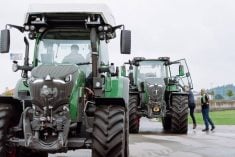KELOWNA, B.C. – Hans Buchler has been so busy working in agricultural politics that it’s amazing he has had time to farm.
As it was, his hectic lifestyle got in the way of plans to start a winery.
“It was always in the back of my mind,” said Buchler, who grows grapes on 18 acres near Oliver, B.C.
“I became involved in too many other things. It’s a totally different business and incredibly time consuming.”
Read Also

Why feds imposed EV tariffs
Moe and Kinew have a fight on their hands when it comes to eliminating the EV tariff. Canada has to worry about pissing off the U.S. and Mexico and hundreds of thousands of auto workers.
Buchler, who emigrated to Canada in 1981, was a driving force behind the B.C. Wine Grape Council and was instrumental in turning the B.C. Enology and Viticulture Conference into the third largest of its kind in North America.
He was a founding member and president of the Certified Organic Association of British Columbia, has been a major contributor to the National Wine Standards and the Canadian Grape Wine Research Strategy and has sat on many other boards and committees.
In spite of all his activism, he was surprised to win the 2011 Award for Excellence in Leadership, presented by the B.C. Agriculture Council, of which he was board member for four years.
“I was surprised, a little bit shocked and had a hard time grasping this initially. It was a great honour.”
Buchler and his wife, Christine, moved to Canada after his in-laws sold their organic farm in Switzerland.
“In the late ’70s, land prices in Switzerland were so outrageous it was impossible to buy a farm and make a living unless you were independently wealthy.”
Buchler searched for land from Ontario to B.C. before finding some near Oliver. It sold before he could buy it, but three years later, when he and Christine came looking again, it was back on the market.
“It was almost fate, about 140 acres, a beautiful piece of land, but a lot of it is unusable, surrounded on three sides by parkland,” he said.
Buchler spent the first year clearing the raw land for Park Hill Vineyards and then planted grapes, mostly hybrids, but also vinifera, although many local vintners then believed European varieties wouldn’t flourish in Canada.
“I didn’t share that idea, but at the same time, I was cautious because vinifera has a harder time. It was definitely easier to grow hybrids, but you have to grow what you can sell.”
A few years later, free trade forced the great grape vine pullout and eventually transformed the industry. The change produced spectacular wines that culminated in Mission Hill Winery stunning the world by winning the Avery Trophy for the best chardonnay.
“We did pull out more than half the acreage, but we did keep some hybrids, such as Marechal Foch. It has become a niche market, maybe because it is organic,” he said.
“There was some angst, but there was also an opportunity because government help was fairly generous and it helped us pay off our debt and make a fresh start.
“The pullout accelerated change. It forced growers to be proactive and adapt to changing times. If it had not happened, we might still have the marketing board, and the marketing board was a barrier to change.”
His grapes have been the foundation for some of Summerhill Pyramid Winery’s sparkling wines that have won gold medals and best of class at European competitions.
Buchler is optimistic about the industry’s future, in spite of the tough economy and the high price of farmland in the Okanagan Valley.
“The cost of production is high, partly because land prices are so outrageously high. It’s difficult for any new producer to start a new vineyard without having a large amount of capital. When we bought the land, you could make a business case, but right now, this is almost impossible.”
The B.C. industry must ensure that grape quality remains high because it can’t compete with cheaper wine.
It is one of Buchler’s concerns, and he helped found the B.C. Wine Council when the B.C. Wine Institute reorganized and dropped research.
“It’s mainly for educational purposes. We do collect levies from growers and we invest into research. It’s critical for the industry in B.C. to be at the forefront in terms of technique.”
Much of his focus is on grapes, but his interests have also extended to general agricultural issues.
His work on the B.C. Agriculture Council has involved developing policy positions on the Agricultural Land Reserve, water for agriculture and food security.
“We have to make sure the population understands the impact and importance of agriculture. Many people in metropolitan areas do not realize what is involved in producing food. We are fighting an uphill battle, although we have made some inroads because more and more people have become aware of food security and the importance of supporting local sectors.”














